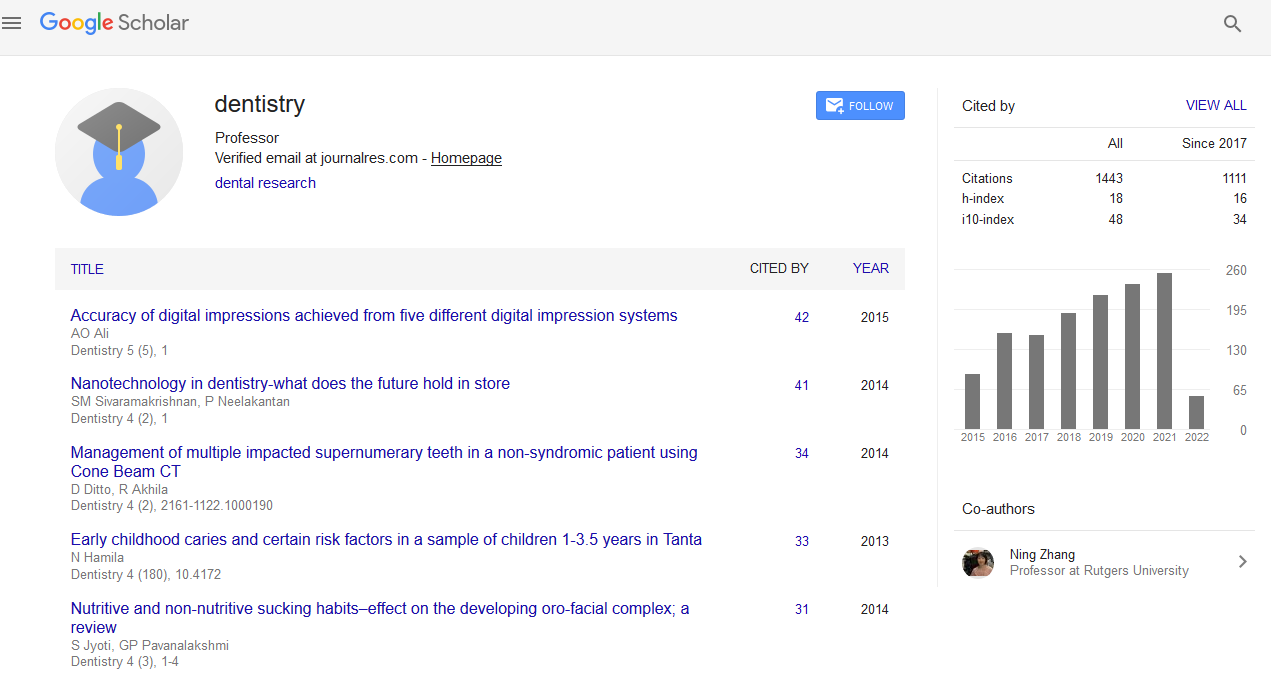Citations : 1817
Dentistry received 1817 citations as per Google Scholar report
Indexed In
- Genamics JournalSeek
- JournalTOCs
- CiteFactor
- Ulrich's Periodicals Directory
- RefSeek
- Hamdard University
- EBSCO A-Z
- Directory of Abstract Indexing for Journals
- OCLC- WorldCat
- Publons
- Geneva Foundation for Medical Education and Research
- Euro Pub
- Google Scholar
Useful Links
Share This Page
Journal Flyer

Open Access Journals
- Agri and Aquaculture
- Biochemistry
- Bioinformatics & Systems Biology
- Business & Management
- Chemistry
- Clinical Sciences
- Engineering
- Food & Nutrition
- General Science
- Genetics & Molecular Biology
- Immunology & Microbiology
- Medical Sciences
- Neuroscience & Psychology
- Nursing & Health Care
- Pharmaceutical Sciences
Healthcare system and oral health prevention in Bulgaria
6th Annual Congress on Dentistry and Dental Medicine
November 22-23, 2018 Bucharest, Romania
Yulia Bogdanova Peeva
Medical University of Plovdiv, Bulgaria
Scientific Tracks Abstracts: Dentistry
Abstract:
Bulgaria's health system faces several serious challenges at the same time. She has the second lowest life expectancy in the EU (after Lithuania) and some alarmingly high risk factors of behavior (smoking, drinking, increasing obesity) as well as a rapidly aging population, workforce shortage and low healthcare costs. On a positive note, a higher percentage of 15-year-old boys and girls in Bulgaria report regular physical activity than in other EU countries, although less than 25% report engaging in moderate-vigorous physical activity on a daily basis. Bulgaria should choose to strategically spend their limited resources and sustainability of health system. Based on the analysis of the health-demographic status of the population, Bulgaria has also defined national health objectives. They express the focus of health policy on the sustainable improvement of the health of Bulgarian citizens in all age groups: ??? To decrease in children mortality aged 0-1 to 6.8 per 1000 live births; ??? To decrease in children mortality aged 1-9 up to 0.24 per 1000; ??? To decrease in adolescents mortality aged 10-19 years to 0.28 per 1000; ??? To decrease in mortality among persons in economically active groups from 20-65 years to 4.19 per 1000; ??? To increase the average duration of the upcoming experience of people after the age of 65 to 16.4 years. The health status of people in Bulgaria has improved more slowly than in other EU countries, as shown by persistently low life expectancy. Several recent reforms have attempted to shift the Bulgarian health system away from over-reliance on hospital care and to increase efficiency. Nevertheless, challenges in terms of access and quality remain substantial. Theoretically, the NHIF covers dentistry. However, oral health care for adults funded by NHIF is limited to one annual routine examination (checkup) and three items of treatment, comprising fillings (amalgam and composite restorations) and/or extractions under local anaesthesia. For children and adolescents under the age of 18 years, treatment may include up to two endodontic treatments, as well as the items that can be provided for adults. The oral and dental status of the Bulgarian patients can be assessed as average damaged with high treatment needs. To make it better a lot of health promotional and dental preventive activities are needed especially in the field of improving hygiene habits, use of additional funds for hygiene and more frequent dental visits of the whole population.
Biography :
Peeva was born in Plovdiv, Bulgaria in 1971. She graduated Medical University of Plovdiv in 1994 with Master degree of Dentistry. The title of her successfully defended PhD thesis is "Awareness and motivation for orthodontic treatment of children from Plovdiv" (2015). Specializations: 2008 Social Medicine and Health Management (Sofia); 2010 Uludag University Bursa, Turkey; 2012 University Studi di Genova, Italy; 2014 American Austrian Foundation, Open Medical Institute of Austria, Salzburg; 2017 Fundacion Universitaria de Ciencias de la Salud (FUCS), Bogota, Colombia; 2018 EADPH Spain. Scientific Interests: orthodontics, public health, prevention and prophylaxis of oral health, e-health, health management, European health law and policies, etc. Textbooks: Peeva Yu. Awareness and motivation for orthodontic treatment through the eyes of orthodontists, children and parents. Sofia: Leading technologies in dentistry’ company, (2017). 260 p. ISBN 978-954-90363-8-1.
E-mail: julipeeva@abv.bg


